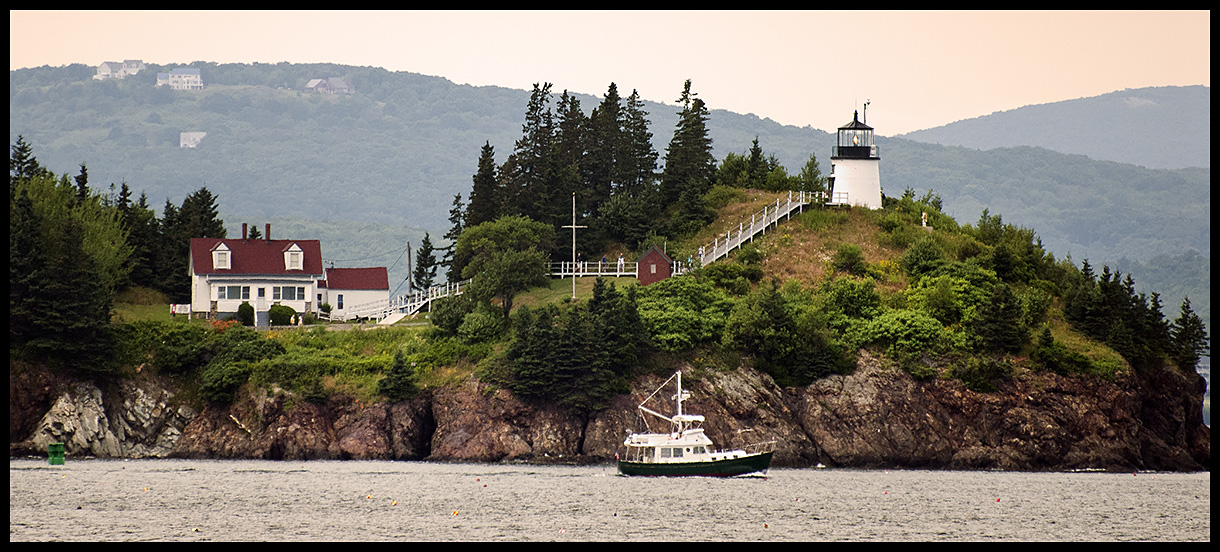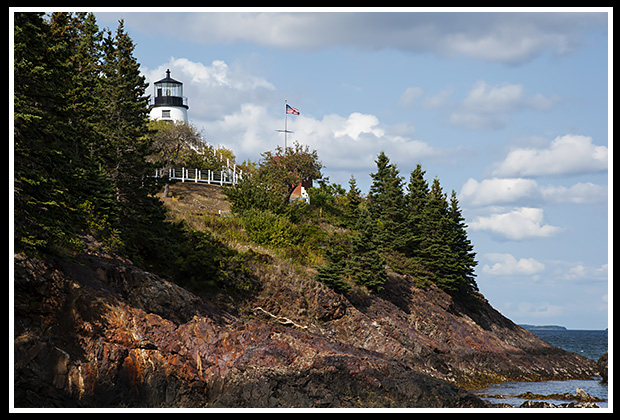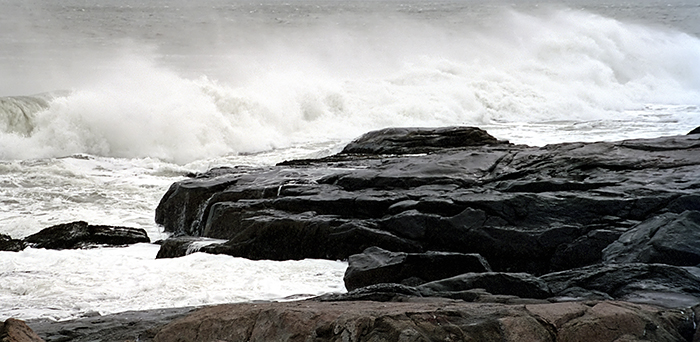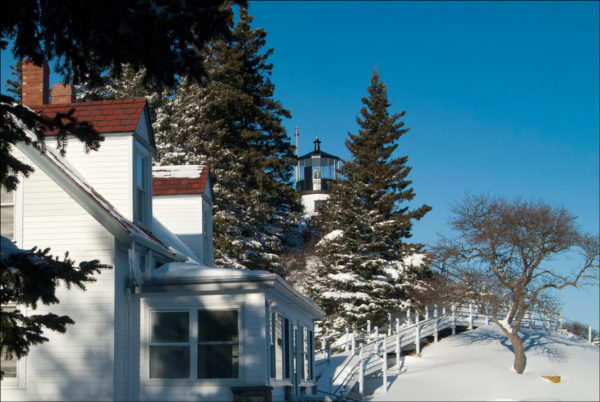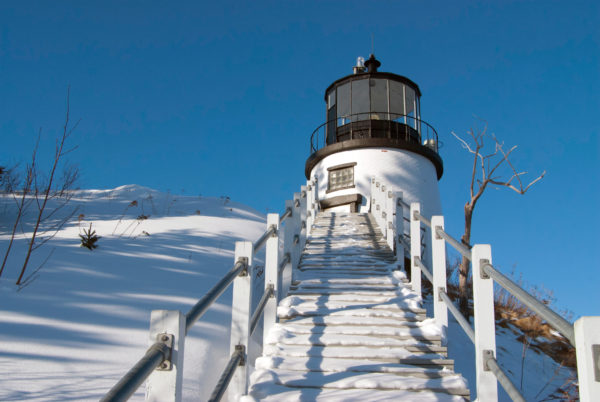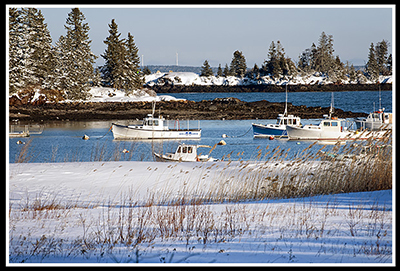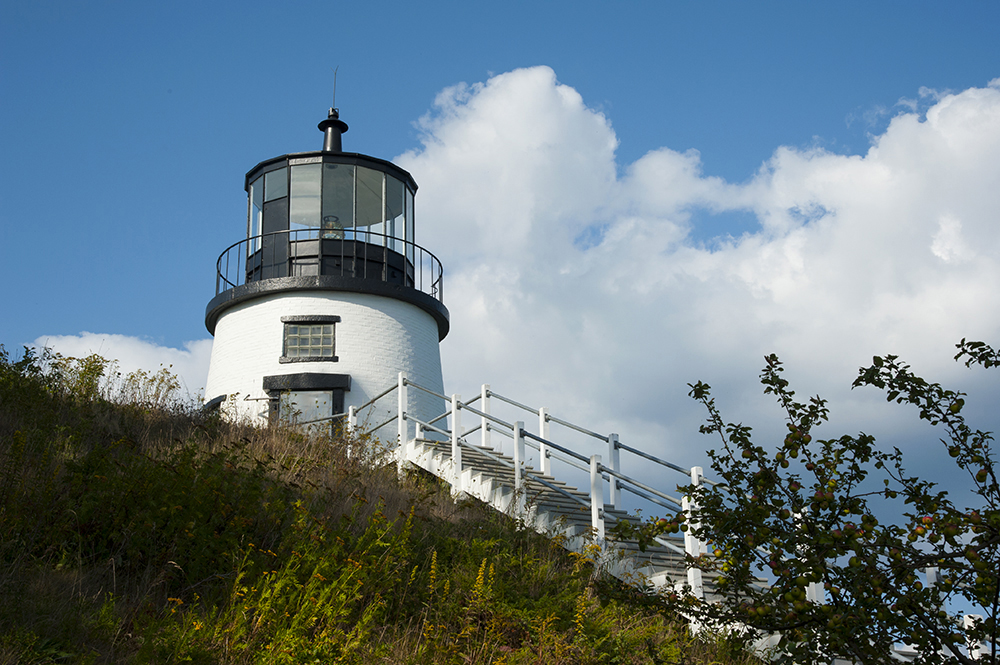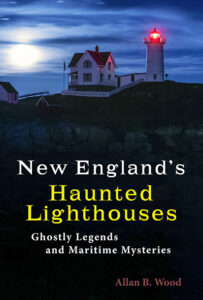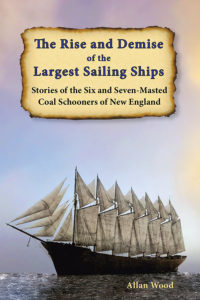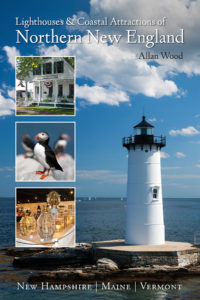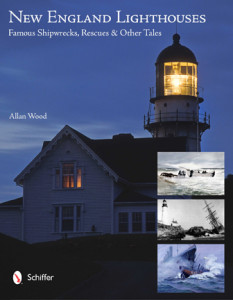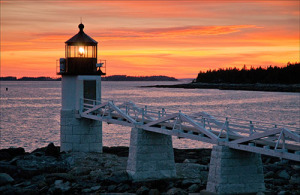The Rescue of the Frozen Lovers by Keeper Henry Achorn Near Owls Head Lighthouse in Maine
Owls Head lighthouse marks the entrance to Rockland Harbor and has always been the site of many shipwrecks. Though only 20 feet tall, its tower is over a high rocky cliff 100 feet above the water. These rocky formations empty into the ocean surrounding the area.
One of the most famous bizarre rescues in Maine’s maritime history occurred at Owls Head Light in Maine during the winter storm of December 22, 1850. Five vessels went aground in this storm between Rockland Harbor and Spruce Head, located about eight miles away. The weather was bitterly cold at temperatures below zero, and the gusting winds cast an icy coating from the waves on any vessels anchored in the harbor. As the storm approached, all vessels were inside the harbor, intensifying as the night passed.
A small coasting schooner from Massachusetts was anchored at Jameson’s Point Wharf, near Rockland, ready for a morning start for Boston the following day. The captain had gone ashore and had not returned that night, leaving Seaman Roger Elliott, the mate, Richard B. Ingraham, and passenger Lydia Dyer, who was also Ingraham’s fiancé, aboard the vessel.
Late in the evening, around midnight, the storm came full force into the region as the gusts intensified and the seas thrashed about. The cables holding the schooner snapped, and the heavy winds caused the boat to drift across the harbor towards the rocky shoreline of Owls Head. Ingraham and Elliot tried to control the vessel, but the winds were too much for their efforts as the schooner became stuck on an icy ledge just south of Owls Head Lighthouse. It was wedged so tightly that the schooner did not sink as it filled with water, leaving the deck exposed just above the waves that would constantly break over it.
With no help in sight or any signals of distress to send, the three frightened survivors covered themselves from head to foot with large woolen blankets, creating a form of a cocoon to try to fend off the icy spray and somehow stay dry. Ingraham placed Lydia Dyer first on the blanket, as he placed himself next to her, then Elliot placed himself at the other end next to Ingraham. They huddled together on the deck and waited, hoping help would arrive as they could barely see the light emanating from the lighthouse.
The tide rose as the frigid waves continued to break over the deck, forming an icy coating on anything they touched. The hours passed, and the evening wore on without help. All three could feel themselves weakening as they started succumbing to exposure while the gusting winds and freezing surf continued to pound the vessel. Their woolen blankets became an icy tomb as Ingraham and Dyer were unconscious from the additional weight.
The intensity of the surf was also becoming too much for the schooner as it started to break apart from the waves constantly washing over her slowly. Fearing that the couple may have already perished or were very close to death, Seaman Elliot knew that they would all certainly freeze to death if he could not find help soon. He assured the couple that he would find help and be back for them, but they did not hear him.
It was just before daybreak, and the tide was starting to retreat. Elliot tried to hack his way out of the side of the ice-covered blanket using his sheath knife. He continued to chop away until he finally managed to free himself from its frozen grasp. As the waves thrashed around, he jumped off the wreck into the frigid waters. Slowly and carefully, he would grab hold of slippery rocks, wait for the waves to recede, and then scramble onto another group of rocks as the waves came over him. He would then hold on as the undertow would start to draw back and start again. His hands and feet were bloodied from being slammed onto the rocks.
Finally, he managed to get close enough to climb over the ice-covered rocks using his hands and knees to the shoreline. He knew he had to keep moving in the bitter chill, or he would freeze to death. He climbed up through snowdrifts up the hilly terrain towards the direction of the lighthouse. Nearly overcome with exhaustion and exposure from the cold, he reached the road to Owls Head Lighthouse. Luckily, Keeper Henry Achorn was riding by in his sleigh, worried about possible wrecks from the storm. He quickly brought the exhausted Elliott to the keeper’s house. Exhausted and overcome from exposure, he told the keeper that Richard Ingraham and Lydia Dyer were still on the schooner. Keeper Achorn quickly rounded up a group of neighbors, and they headed to the shoreline, following Elliot’s footprints in the snow. They finally sighted the wreck, wedged on the rocks a short distance from shore.
The waves and winds started to subside a little, allowing the keeper and his crew to reach the wreck eventually. There, they found Ingraham and Dyer clinging together inside the blankets under the thick coating of ice. It looked like the couple had perished from all appearances, but Keeper Achorn believed he could feel a faint pulse in each and was determined to bring them back to the keeper’s house and revive them. The men carefully hacked off whatever ice they could from the blanket, then brought Ingraham and Dyer onto the lifeboat. They carefully placed them in the sleigh and quickly got the couple inside the warm kitchen of the keeper’s house.
While keeping the pair in cold water just above freezing to increase their temperature slowly, they removed their clothing and any ice on their bodies. They then covered them in warm blankets and slowly raised the water’s temperature. Keeper Achorn was convinced they still had to be alive, feeling what he believed to be a faint pulse on both victims.
The men took turns massaging and exercising Ingraham and Dyer’s cold, limp arms and legs. After almost two hours of exercising and rubbing limbs, they were astonished to find Lydia Dyer showing signs of life. They kept vigorously on their tasks. Another hour passed, and Ingraham miraculously opened his eyes and said, “What is all this? Where are we?”
The following day, Dyer and Ingraham had survived the ordeal and could eat a little. It took several weeks to get up and walk around, and it was many months before they fully recovered. They married that following June and had four children. Seaman Roger Elliott would never recover from exposure while trying to save the pair and would never return to the sea. His struggle to stay alive and inform Keeper Achorn resulted in the miraculous rescue of Lydia Dyer and Richard Ingraham, the frozen lovers of Owl’s Head.
The captain of the ill-fated schooner was never found, and many believe he may have learned that either this was his last trip and was to be fired, or he had heard about the wreck while he was ashore and left town to avoid blame.
Exploring Owls Head Lighthouse in Maine
Owls Head Light State Park provides many places to hike along some of the trails along the cliffs and shoreline, and you can walk up to Owls Head Light. The lighthouse is situated atop spectacular cliffs with beautiful views of Rockland Harbor and the beacon and is easily accessed by a stairway. Tours may be provided inside the tower and keeper’s building by the American Lighthouse Foundation during the summer, as the keeper’s house is now part of their headquarters.
Visit the Owls Head Transportation Museum, which showcases antique autos and planes.
Here are a few photos of Owls Head Lighthouse.
Enjoy!
Allan Wood
Books to Explore
New England’s Haunted Lighthouses:
Ghostly Legends and Maritime Mysteries
Discover the mysteries of New England’s haunted lighthouses! Uncover ghostly tales of lingering keepers, victims of misfortune or local shipwrecks, lost souls, ghost ships, and more. Many of these accounts begin with actual historical events that later lead to unexplained incidents.
Immerse yourself in the tales associated with these iconic beacons!
The Rise and Demise of the Largest Sailing Ships:
Stories of the Six and Seven-Masted Coal Schooners of New England.
In the early 1900s, New England shipbuilders constructed the world’s largest sailing ships amid social and political reforms. These giants were the ten original six-masted coal schooners and one colossal seven-masted vessel, built to carry massive quantities of coal and building supplies and measured longer than a football field! This self-published book, balanced with plenty of color and vintage images, showcases the historical accounts that followed these mighty ships.
Available also from bookstores in paperback, hardcover, and as an eBook for all devices.

Book – Lighthouses and Coastal Attractions in Southern New England: Connecticut, Rhode Island, Massachusetts
Lighthouses and Coastal Attractions of Southern New England:
Connecticut, Rhode Island, and Massachusetts.
This 300-page book provides memorable human interest stories from each of the 92 lighthouses. You can explore plenty of indoor and outdoor coastal attractions, including whale-watching excursions, lighthouse tours, windjammer sailing tours, parks, museums, and even lighthouses where you can stay overnight. You’ll also find plenty of stories of hauntings around lighthouses.
Lighthouses and Coastal Attractions of Northern New England:
New Hampshire, Maine, and Vermont.
This 300-page book provides memorable human interest stories from each of the 76 lighthouses, such as the rescue of the frozen lovers at Owls Head Light in Maine. It also describes and provides contact info for plenty of indoor and outdoor coastal attractions and tours. These include whale watching, lighthouse tours, unique parks, museums, and lighthouses where you can stay overnight. There are also stories of haunted lighthouses in these regions.
New England Lighthouses:
Famous Shipwrecks, Rescues & Other Tales
There are over 40 stories, including a detailed version of the rescue of the frozen lovers at Owls Head Lighthouse in midcoast Maine. This image-rich book also contains vintage images provided by the Coast Guard and various organizations and paintings by six famous Coast Guard artists.
You can purchase this book and the lighthouse tourism books from the publisher Schiffer Books or in many fine bookstores such as Barnes and Noble.
Copyright © Allan Wood Photography; do not reproduce without permission. All rights reserved.
Join, Learn, and Support The American Lighthouse Foundation
